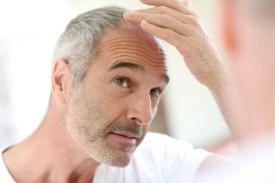Hair loss and hair thinning are common
conditions that can be easily observed among the present generation.
Baldness can be a caused due to genetic factors, pollution, and
unhealthy diet. Yes, unhealthy diet. According to the best
dermatologist, most people undergo hair transplant in Delhi because they are experiencing excessive hair fall that is causing baldness at their crown or top area of the head.
The victims keep on changing several
shampoos, hair oils, protein creams, and other remedies to stop the hair
fall, but everything fails because they don’t realize that making
certain changes in their diet and routine can actually do the work. Eat
the correct balance of the required vitamins and minerals to keep the
hairs healthy, shiny, and lustrous.
Proteins – Even if you undergo certain hair transplant methods,
you will need to have sufficient amount of proteins because the hairs
are made of protein and this is the most crucial diet source to keep
them healthy and strong. Protein deficiency can result in hair dryness,
split ends, and brittleness, which may soon cause hair loss and
thinning. Include chicken, fish, eggs, and dairy products in the diet to
ensure sufficient protein intake.
Iron – An Anemic person is more prone to
hair loss and baldness because nutrients rich blood supply feeds the
hair follicle and their root. When a serum ferritin (iron) level falls
below a specific level, a person may experience the symptoms of being
anemic. Thus, lentils, spinach, and leafy green vegetables are a rich
source of iron.
Vitamin C – Vitamin C works as an
antioxidant in the blood, thus, the dermatologist suggests including
blackcurrants, broccoli, blueberries, guava, oranges, kiwi fruits,
papaya, sweet potatoes, and strawberries in the diet.
Omega-3 – It is broadly found in oily
fish (like salmon, sardines, trout, herring, and mackerel), avocado,
walnuts, and pumpkin seeds. It is important even after the hair transplant in Delhi because it provides essential oils that keep the scalp and hair hydrated. Omega-3 fatty acids are important for our body.

No comments:
Post a Comment